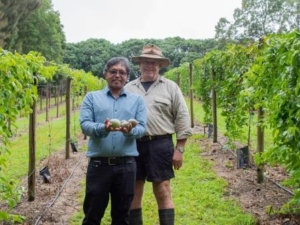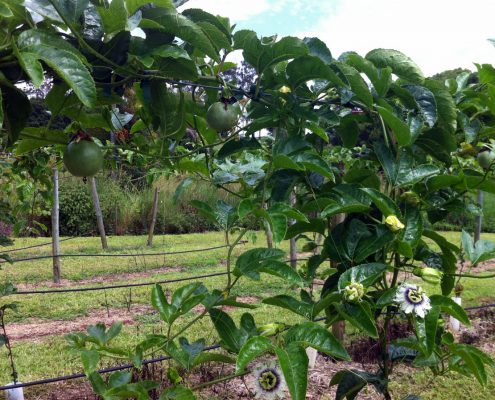Project Overview – PF22000
The National Passionfruit Breeding and Evaluation Program has been recently contracted to deliver new passionfruit varieties for Australian growers.
The new 5-year passionfruit breeding project PF22000 is being funded by Hort Innovation through the passionfruit research and development levy, and funds from the Australian Government.
Currently, the Australian passionfruit industry faces several problems, including the unavailability of new varieties, yield declination of the main scion varieties (Sweetheart and Misty Gem), blind tipping, and reduced vigour, inconsistent fruit size, disease susceptibility, and adaptation challenges to changing climates.
Dr Mo Alam with Keith Paxton. A trial site is located on the Paxton and Crowhurst family farm in Woombye. Photo Credit: Megan Pope.
![]()
Delivery Partner
Project Leader Dr Mobashwer (Mo) Alam, University of Queensland
The project is also receiving support from the University of Queensland who have been selected as the Service Delivery Partner. The primary goal of this project is to develop a new breeding strategy to reboot Australia’s passionfruit industry.
The research team consists of lead researchers from Queensland Alliance for Agriculture and Food Innovation (QAAFI) at the University of Queensland.
- The project leader, Dr Mobashwer (Mo) Alam, brings over 20 years of experience in national and international plant breeding research and development (R&D) in horticultural, industrial and field crops
- Professor Bruce Topp is a renowned horticultural crop breeder
- Associate Prof Craig Hardner is a globally recognised Quantitative geneticist
- Professor Topp and Associate Professor Hardner have over 40 years of research experience in the Australian horticulture industry
- Associate Professor Heather Smyth has two decades of research experience in flavour chemistry and sensory science
- Associate Professor John Thomas has over 40 years’ experience as a plant virologist, with extensive research experience in virus diseases of passionfruit
The primary objectives of this new project are to:
- Generate new progenies for the development of new passionfruit selections with improved agronomic performance, product quality, and consumer appeal
- Develop hybrid varieties for industry adoption
- Develop and apply new technologies and methods to enable rapid breeding
- Generate comparative performance data for progenies
- Communicate performance of new selections and varieties to the Australian passionfruit industry
With input from the research team, this project seeks to focus on developing new passionfruit varieties for the industry, considering production requirements, consumer preferences and quality and pest and disease tolerances.
Dr Alam will also investigate the potential value of accessing passionfruit genetics from breeding programs overseas to feed into the Australian passionfruit breeding program.
The current breeding program is funded through until the end of 2027 and Dr Alam will use a range of approaches to improve the chances of successfully identifying superior passionfruit selections, including efficient breeding strategies, bioeconomic and choice preference models, development of molecular markers for productivity and quality traits and a genomic selection model for yield.
A germplasm collection will also be established to feed into breeding efforts. Each year, progeny will be developed and assessed for performance.
The project will work with industry representatives and also include grower-based trials for promising selections to be evaluated in the field under different production conditions.
Read all of previous project updates (PF15000 and PF19000) published in The Passion Vine
Technical terms explained
Ownership (of plant material)
A few examples where ownership is not clear cut: A grower may ‘own’ plant material of a certain variety on his/her property, but the intellectual property (IP) rights for that variety may be owned (e.g. via PBR) by a breeding company for example. This may legally restrict the ways in which the grower utilises that plant material.
An organisation may have equity in the development of plant material, but might not be the owners of that plant material.
A separate organisation may commercialise a new plant variety in agreement or as a licensee of the owners of that variety.
Plant Breeders Rights (PBR)
Plant Breeders Rights (PBR) are a form of intellectual property protection like patents, Trademarks and copyright, that apply to a registered plant variety. Plant Breeders Rights may be granted to the breeder of a new variety to enable them to have a temporary monopoly on the new variety for commercial benefit. PBR aims to encourage investment in breeding new varieties as it enables the recouping of investment in past plant breeding and research. Plant varieties can also be subject to other forms of intellectual property such as patents, copyright, confidential information and trademarks. For a new variety to be considered for PBR registration it must be shown to be: new, distinct, uniform and stable. Only a breeder of a plant variety is entitled to make any application for the grant of a PBR in the variety. The breeder can however, be an incorporated or unincorporated body.
Non-Propagation Agreement
An agreement between the owner or licensee of plant material and the grower, whereby the grower agrees not to propagate any further the plant material which the owner agrees to make available to the grower. If it is a PBR protected variety, the owner of PBR can set the terms under which they allow growers to use PBR protected material, e.g. by utilising a non-propagation agreement. These agreements may also set out the terms of any royalties payable in respect of the propagation of the protected variety.
Materials Transfer Agreement (MTA)
A Material Transfer Agreement (MTA) is an agreement or contract that governs the transfer of tangible research materials between two organizations. The MTA defines the rights of the provider and the recipient with respect to the materials. For the provider, the advantages of having an MTA include the ability to restrict the use of the material to non-commercial research and reduce legal liability for the recipient’s use of the material.
Tenants in common
This term is usually applied to ownership of real estate. Tenants in common are co-owners, but they do not necessarily have equal shares in ownership e.g. it may be 1/3rd for one and 2/3rd for the other. There can be several owners as tenants in common all with different shares. Tenants in common can each deal with third parties as to their share as a separate owner, generally without the need for other co-owner’s consent (unless they have a co-ownership agreement in place). Each tenant in common is free to sell or otherwise deal with their interest at any time (unless there is in place a co-ownership agreement which contains terms restricting this).
If you have other suggestions for technical terms that need a layman’s explanation, please let us know
Project Overview PF19000
The next phase of the National Passionfruit Breeding and Evaluation Program has been contracted to continue breeding research to deliver new varieties for Australian growers.
The program has been led by Dr Peter Bundock and a research team at Southern Cross University since 2016. The new 5-year project is funded by Hort Innovation using the passionfruit research and development levy, and funds from the Australian Government, and supported by contributions from Southern Cross University.
As most of you will know, the main scion varieties of passionfruit grown in Australia – Sweetheart and Misty Gem – have been propagated by tip cuttings for some years and a number of problems have been reported including reduced fruit size and yield compared to the original selections, more frequent blind-tipping and also problems with finding suitable tips for grafting due to thinner tips.
The new project will continue and expand on the first phase of the breeding program building on the expertise and resources developed over the past four years. The project will concentrate mainly on scion variety breeding and aims to produce, select and evaluate new high-yielding scion varieties for Australian passionfruit growers. Some initial work aimed at producing a new Panama line will also be commenced.
As part of this new phase, the project will continue to engage with growers through field walks, presentations, industry news articles, and will seek input from a project reference group of growers to steer priorities towards grower needs.
Delivery Partner
Southern Cross University, Lismore, NSW:
The ongoing research team includes Dr Peter Bundock, Associate Professor Tobias Kretzschmar, Frances Eliott and Will Petrie. Management of the project will be transferred to Dr Cathy Nock in mid 2021 following an extended transition period to ensure the security of project data, background information, germplasm and technical expertise.
Cathy is a research fellow at Southern Cross University. She has lived in the Northern Rivers of NSW for over 25 years and her main research interest is subtropical horticulture. Cathy is a geneticist with expertise in pre-breeding and breeding research, data and project management, and germplasm conservation. She has successfully led Hort Innovation macadamia research projects and is a collaborator on the Australian macadamia breeding program.
Together, the Southern Cross University team has knowledge of the current passionfruit breeding methods and industry requirements along with a commitment to applying new methods to create new opportunities for producing passionfruit varieties into the future. Cathy is looking forward to meeting growers over the coming months and to working with the passionfruit industry.
Broad Objectives for PF19000:
Field trialling program designed to select the best performing varieties for growers.
Early-stage trial vines (1st and 2nd stage – see Breeding Cycle diagram below) will be evaluated primarily at Alstonville, with advanced selections trialled, where possible, across the three main growing regions of Northern New South Wales/South East Queensland, Wide Bay region and North Queensland.
Performance data collected for advanced material for grower information.
Production of partially inbred selections with the aim of producing a purple Panama
Maintain arboretum and expand the seed bank to preserve important germplasm
Establish a Breeding Management System for data acquisition, long-term storage and analysis
PhD student project with scholarship provided by Southern Cross University:
Determine which parent scion varieties produce the best progeny by estimating breeding values based on important traits. These best parents then used to produce larger numbers of progeny for the selection of a future variety.
Study of genetic variation for fruit shelf life.
Project Overview PF15000
Southern Cross University (SCU) is undertaking the National Passionfruit Breeding Program (PF15000) in a three year project.
During this period SCU will
1 identify candidate new scion varieties generated from bi-parental crosses;
2 establish an improved system for selecting new passionfruit cultivars for commercial production including standardised measurements from trial participants with trial and varietal information recorded in a central database;
3 obtain pre-breeding information on traits of interest such as inheritance patterns and associations with DNA markers along with the construction of a reference linkage map;
4 create additional sources of new material for future trialing by breeding new inbred lines from current material and F1 hybrids from current in-bred lines;
5 establish a seed bank to conserve and enhance current passionfruit genetic material; and
6 maintain the industry arboretum.
Delivery Partner
Southern Cross University, Lismore, NSW:
Associate Professor Tobias Kretzschmar – Southern Cross Plant Science
Tobias.Kretzschmar@scu.edu.au
Associate Professor
Southern Cross Plant Science
T +61 2 6626 3406
M +61 457 464 130
Role: Co-chief Investigator, with overall oversight of project
Dr Peter Bundock – Research Fellow, Southern Cross plant Science
BSc in Biochemistry (University of New England), PhD in Plant Science (University of Tasmania)
peter.bundock@scu.edu.au
Role: Co-chief Investigator and project manager, taking care of day to day running of project, organisation and analysis.
Experience: Extensive experience in plant molecular biology and molecular genetics and managing research projects
Alicia Hidden – Horticultural Technician, Southern Cross Plant Science
Diploma Horticulture (Landscape design) TAFE NSW, Bachelor of Environmental Science (Hons) SCU Lismore, Conservation Land Management cert IV TAFE NSW
Role: Propagating and maintaining plant material in glasshouse and field
Experience: recent experience in caring for plants in growth chambers, glasshouse and propagation, as well as past experience with re-vegetation
Sub-contractors:
David Peasley – Peasley Horticultural Services
peasleyhort@bigpond.com
Role: In the first year carry out passionfruit crosses and train SCU staff in crossing. Throughout the three year project – (1) maintain and extend/carry out trials at the passionfruit industry arboretum at Duranbah and (2) provide advice to SCU personnel.
Experience: Involved with passionfruit breeding for about 30 years, carrying out crosses between varieties, assessing candidate varieties, establishing and maintaining the passionfruit industry arboretum. Also has extensive experience with other horticultural crop species such as bananas and coffee.
John & Vicki McLeod
vickinjohn@live.com.au
Role: To manage the Burringbar trial site which currently consists of approximately 700 vines. This includes two large bi-parental crosses of over 300 vines, one of which is the current test mapping population. John & Vicki will be responsible for pruning vines, spraying for pests and diseases, irrigation and fertilising the trial site along with keeping the labeling of vines up to date and keeping site records.
Experience: John and Vicki have been successful passionfruit growers for many years and are currently a major supplier of grafted passionfruit plants for the industry from their nursery at Dungay in northern NSW.











